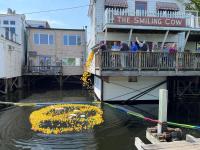Put smart safety rules in place for short-term rentals
I’m offering my input into the new short-term rental ordinance in the town of Rockport based on my 15 years with the Rockport Fire Department as a volunteer and as a cofounder of the largest rental agency in town that helped grow short-term rentals in Rockport (with which I am no longer affiliated). I am now an international short-term rental safety expert and work with cities and towns all over the U.S., Canada, Mexico and Australia helping put smart safety rules in place for short-term rentals.
You can read more about what I’m doing in an article posted in this publication a year ago last September, Rockport man puts rental safety first, or on my website at https://www.justinford.expert/.
I saw Marsha Steinglass’s opinion piece here on Jan. 24 and wanted to comment on it, as well.
Marsha is correct that the Rockport short-term rental ordinance as written is a disaster.
There are short-term rental regulations in place all over the world now. Most cities and towns popular with them, have good regulations in place. I was in Gatlinburg, Tennessee, recently where they have very little safety incidents from short-term rentals because they have smart rules in place. So does Austin, Texas, so does Asheville, North Carolina. And on and on.
Rockport’s is not written to make rentals safer as it is now and goes too far off track to prohibit them, which should never happen. I did an economic impact study on short-term rentals for the Chamber back in 2014. My research showed that short-term rentals brought more money to the Midcoast economy than hotels or inns did.
Last February, I offered to the Town of Rockport my company’s services for free to do safety certifications of short-term rentals in Rockport. The Town Manager replied that he would save my offer for future reference.
I haven’t heard from him again.
In the meantime, the Town has moved forward with the idea of the CEO and/or Fire Chief to do those inspections, which would cost the Town money and take away from the important roles that the CEO and Chief have.
I know the duties of the Rockport Fire Chief well. He’s the only full-time firefighter in Rockport. Residents don’t want him out checking short-term rentals, they want him working to make sure all of the town is protected. My offer still stands to Rockport. Rockport is my hometown and my family and kids still reside there.
When I made my offer again in public last spring, I got an email from Marsha saying what she wrote in her opinion, so it appears she saved that email to me to rehash it again in this opinion piece.
She wrote: “Do the makers of this document think we residents [of Rockport] don’t know how to live safely and in habitable conditions? Are they kidding? How insulting. Believe me, we are a well-educated, responsible, intelligent, comparatively successful citizenry. “
There are a lot of problems with that question, I believe.
Short-term rentals are the most dangerous sector of the hospitality industry. More people have died or been injured staying at a short-term rental than any other form of hospitality worldwide.
The last death at a short-term rental in Maine was two months ago when a renter took out a kayak supplied at his short-term rental property that had no warnings, no lifejackets and he drowned. Some may say that was on the renter, not the owner. I disagree.
Go over to Maine Sport and see what documentation and safety requirements are in place to rent a kayak. That someone can just pay for a short-term rental home and come hop in the supplied kayak with no safety talk or disclosure is pure negligence on the part of the supplier.
Despite some cities and towns having safety regulations in place, many more don’t.
Short-term rentals are a form of public accommodations. They may be in someone’s private home and they may be available based on the discretion of the property owner, but in reality, anyone in the world can pull up a listing for a rental in Rockport, Maine, and rent it and come occupy it.
They can do the same for a hotel, motel, windjammer cruise or a B&B stay. The only difference between all those accommodation types is that all but short-term rentals must be inspected for safety adhering to government requirements.
Under Marsha’s thinking, a windjammer captain, and other motel and inn owners in Rockport must be uneducated, irresponsible, unintelligent, and comparatively unsuccessful citizens because the government inspects their accommodations businesses for safety and doesn’t trust them to do it.
Could you imagine if the Coast Guard stopped inspecting windjammers? Before safety inspections of passenger vessels, many steamboats sank along the Maine coast.
I’ll be as gentle as I can and not share the listings specifically, but I brought up Airbnb online and looked around Rockport at the short-term listings available.
There were very few rentals I could find in Rockport that are NOT in violation of International Building Code (IBC) - 2015 or other State recognized safety standards. According to the Office of State Fire Marshal (Maine) https://www.maine.gov/dps/fmo/building-codes, that is the current edition to which Maine adheres.
In that code, there are requirements for properties being used for transient renters. That code is referred to frequently in civil lawsuits against hosts and owners of short-term rentals around the U.S.
One notable one is a lawsuit recently settled in Idaho where four people died in a short-term rental, among other things, because instructions on operating a fireplace weren’t presented for the renters and there was no fire extinguisher, as required by IBC 906, in the short-term rental property.
So, while the Maine State Fire Marshal doesn’t have enforcement powers of ensuring residential building codes are adhered to in short-term rentals in Maine, someone can still sue and win in civil court.
For a renter to win in civil court, they just have to show that the property owner or manager knew or should reasonably have known that the rental property was presented in an unsafe condition. Since everyone in Maine should know that Maine has adopted the 2015 IBC, they should know what is safe and what isn’t.
When I looked at several properties up in the Porter and South Street area of Rockport on Airbnb, I saw a gas grill under an enclosed porch without nine feet of vertical clearance per IBC.
Gas grill fires are common at short-term rentals. Hundreds of fires occur each year. A gas grill under an enclosed roof at a short-term rental condo complex in the Lake of the Ozarks, Arkansas, caught fire this past May and did millions in damage. The renter was cooking under a roof that was too low. But that’s where the owner put the grill, so that is where they used it. I saw another gas grill and smoker directly up against the side of a shingled home Airbnb rental in Rockport.
IBC says that grills should be at least 10 feet from structures. In Massachusetts, they don’t even allow grills up decks any more and have seen a huge reduction in grill fires as a result. As a Rockport firefighter, I attended to many grill fires in town over the years. They do happen.
Continuing to look online at available Rockport properties for rent as short-term rentals, I saw a cottage with bunk beds that don’t meet 2007 federal safety standards. You can’t buy bunk beds like that; this owner had to build them to make them that unsafe.
Industry insurance companies like Proper Insurance / Lloyds won’t even insure homes with bunk beds like that because of the high probability of an accident.
Another rental had a hot tub with no posted safety signs like a motel or hotel would have. Two people died in a hot tub at a short-term rental in Aspen, Colorado, in November by not adhering to safety requirements that were not presented by a safety sign. A sign may have avoided that tragedy by recognizing the dangers of a hot tub. That’s why there are warning signs at the Samoset hot tubs and pools.
One short-term rental I looked at in the village of Rockport has an open loft with a ladder that is so dangerous, I hope that the owner sees this opinion piece, knows who they are, and pulls their listing right away. IBC requires a 36” tall guard rail over any open space that is more than three feet above the floor below it.
I believe that the short-term rental ordinance in Rockport is flawed, but could be easily addressed by looking at other cities and towns around Maine and the U.S. that have adopted safety regulations for their rentals. Those regulations haven’t stifled owner’s rights to rent their homes out, they have just ensured that they are safe. Rockland, Kennebunkport, Cape Elizabeth, and Bar Harbor are examples.
The 2019 motel death in Rockport where a person died in a commercial lodging establishment from smoking in bed should be a wake-up call to Rockport. If, as alleged, a motel operator, who was under government required safety inspections, can disable a fire alarm leading to someone’s death, imagine what someone who has no background in safety can do without any inspections of their short-term rental to ensure that a person coming to Rockport to enjoy the scenery and spend money in local businesses can do by just throwing their uninspected rental up online.
It’s not a matter of what accident will lead to a severe injury or death in a short-term rental in Rockport, it’s a question of when will that happen.
Much is voiced about the rights of property owners in Rockport, but what about the rights of the renters?
People paying for accommodations are paying a lodging tax of 9% to Maine. It doesn't matter if the lodging is hotel or Airbnb - it's all 9%. Yet, with hotels and motels, some of that tax goes towards safety inspection and enforcement. What are renters getting for their 9% tax on short-term rentals? For that $90 on a $1,000 rental, they should expect to stay in a short-term rental that meets government safety standards.
After driving eight hours from New York City, they should be able to arrive, probably exhausted, but go to sleep reassured that a carbon monoxide alarm or smoke alarm will go off in the middle of the night if there is an incident and wake them so they can escape timely.
They shouldn’t have to rely on a property owner that may be eight states away that owns that rental, and who hasn't even visited it in years to make them safe. Certainly using a professional rental agency like Camden AC, On the Water in Maine, SummerMaine, or Porch and Pebble is one way to ensure rentals are routinely checked for safety. Some localities now require local agents to manage rentals. More to consider.
Event Date
Address
United States


























